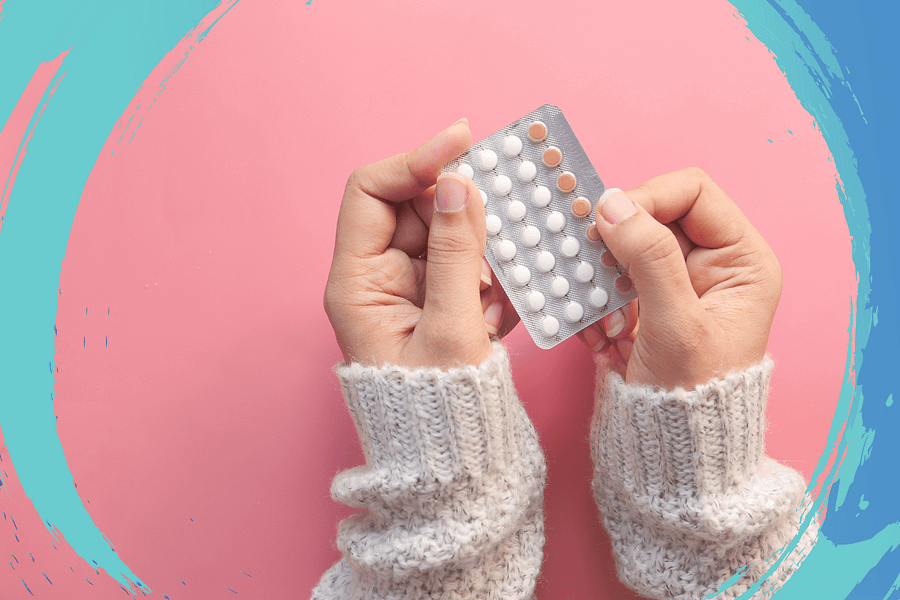Contraceptives & Egg Freezing: Everything You Need to Know
If you’re considering egg freezing, you might wonder how your birth control affects your fertility and the egg freezing process. Does birth control affect egg quality? Should you stop taking contraceptives before freezing your eggs? In this article, we’ll answer these questions and more.
Birth Control and Fertility
Birth control prevents pregnancy by interfering with ovulation, fertilization, or implantation. This is done via hormonal, barrier, or other methods. Common types include birth control pills and intrauterine devices (IUDs). But can birth control cause infertility? What should you know?
Can Birth Control Pills Cause Infertility?
Put simply, birth control pills do not cause infertility. The pill temporarily prevents pregnancy but doesn’t affect your fertility or egg quality long-term. Once you stop taking them, your natural hormone cycles usually return within a few months.
If you’re planning to freeze your eggs, your fertility specialist will help you decide when to stop taking birth control pills.
Can IUDs Cause Infertility
Both hormonal and copper IUDs are reversible forms of contraception that don’t cause infertility. Hormonal IUDs work primarily by preventing fertilization locally in the uterus. Meanwhile, copper IUDs create an environment that’s unfavourable to sperm. Neither type affects your ovarian reserve or egg quality. For most people, fertility returns quickly after IUD removal.
It’s also worth noting that fertility issues that arise after IUD use are typically related to other factors. These may include:
- Age-related fertility decline, particularly after age 35
- Pre-existing conditions—like endometriosis or PCOS (Polycystic Ovary Syndrome)
- Thyroid disorders that affect hormone balance
- Uterine fibroids or polyps that developed independently of IUD use
- Pelvic inflammatory disease (PID) from unrelated infections
- Lifestyle factors—such as smoking or being significantly under or overweight
Can The Birth Control Shot Cause Infertility
The birth control shot (ie. Depo-Provera) doesn’t cause permanent infertility. But, it may take longer for fertility to return compared to other methods. Most people resume regular ovulation within six to 12 months after their last injection. Yet, some might experience a longer delay—up to 18 months in rare cases. And this is essential to consider when planning your egg-freezing journey.
If you’re using the birth control shot and considering egg freezing, discuss the timing with your fertility specialist. Consider talking with an EVOLVE nurse to create a personalized timeline and plan.
Birth Control and Ovulation
Some birth control methods directly affect ovulation. Meanwhile, others work through different mechanisms. For instance, hormonal methods like the pill, patch, or ring prevent ovulation by altering hormone levels. In contrast, barrier methods such as condoms or diaphragms prevent sperm from reaching the egg. This means they don’t affect ovulation at all.
Do You Ovulate on Birth Control?
This all depends on what type of birth control you’re using. As mentioned above, with the pill, patch, or ring, ovulation usually doesn’t occur. However, it may depend on the type of pill you take.
Combined hormonal pills (containing both estrogen and progesterone) prevent ovulation by suppressing the hormones that trigger egg release. When taking these pills consistently, you typically won’t ovulate. Progesterone-only pills, on the other hand, primarily work by thickening cervical mucus and thinning the uterine lining. This means that ovulation may happen while taking this pill.
With hormonal IUDs, many people will still ovulate. These IUDs work primarily by creating local changes in the uterus rather than preventing ovulation. Additionally, copper IUDs don’t affect ovulation at all. They work by creating an environment that’s unfavourable to sperm, preventing implantation.
However, the shot (ie. Depo-Provera) typically prevents ovulation throughout the entire time it’s active. This is why it may take several months after discontinuing the shot for regular ovulation to resume.
Birth Control and IVF
Many people are surprised to learn that birth control can play an important role in the IVF and egg freezing process. Your fertility team might recommend birth control at various stages for different reasons.
Birth Control Before Egg Retrieval
Birth control pills are often prescribed before starting the egg freezing process. This serves several important purposes, including:
Helping synchronize your cycle with the treatment schedule.
Allowing your medical team to better control the timing of your egg retrieval.
Typically, you’ll take birth control pills for one to four weeks before starting your stimulation medications.
Birth Control After Egg Retrieval
After an egg retrieval, the body needs time to recover from the hormonal stimulation process. During this time, your fertility team will provide specific guidance based on your recovery and your future plans.
Birth Control Before Embryo Transfer
If you’re planning to use your frozen eggs in the future for embryo transfer, birth control might be used to:
- Help schedule your transfer at the optimal time.
- Prepare your uterine lining for implantation.
- Coordinate your cycle with any necessary testing.
- Synchronize your cycle with embryo thawing and preparation.
Your fertility specialist will create a customized protocol for you and your specific situation.
Birth Control After Embryo Transfer
After an embryo transfer, birth control is typically not used. If the transfer results in a pregnancy, you’ll continue without contraception. However, if the transfer is unsuccessful, your fertility team will discuss your options. These may include:
- Taking a break between transfer attempts.
- Starting birth control to regulate your cycle before another attempt.
- Exploring different protocols for future transfers.
Taking Charge of Your Fertility
At EVOLVE, we’re here to support you every step of the way. Our experienced team can help you navigate the transition from birth control to egg freezing.
Are you considering egg freezing? Do you have questions about your current birth control method? Talk with an EVOLVE nurse today to learn more about your options. Our caring team is here to help you take control of your reproductive future.
References:



